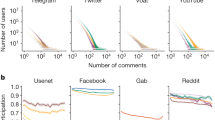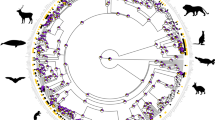Abstract
arising from C. Eisenegger, M. Naef, R. Snozzi, M. Heinrichs & E. Fehr Nature 463, 356–359 (2010)10.1038/nature08711; Eisenegger et al. reply
In February 2010, Eisenegger et al. reported increased fair bargaining behaviour after administration of testosterone in an ultimatum game1. However, unfair offers in the ultimatum game typically are rejected; thus, not only the motives for social cooperation but also the threat of financial punishment may have accounted for these effects. Here, using the public goods game (PGG), we unambiguously show increased social cooperation after testosterone administration, but only among subjects with low levels of prenatal testosterone (measured by the right hand’s second-to-fourth-digit ratio (2D:4D)). This finding establishes positive effects of testosterone on social cooperation, with prenatal hormonal priming providing for important individual variability.
This is a preview of subscription content, access via your institution
Access options
Subscribe to this journal
Receive 51 print issues and online access
$199.00 per year
only $3.90 per issue
Buy this article
- Purchase on Springer Link
- Instant access to full article PDF
Prices may be subject to local taxes which are calculated during checkout

Similar content being viewed by others
References
Eisenegger, C., Naef, M., Snozzi, R., Heinrichs, M. & Fehr, E. Prejudice and truth about the effect of testosterone on human bargaining behaviour. Nature 463, 356–359 (2010)
Bos, P. A., Panksepp, J., Bluthé, R. M. & van Honk, J. Acute effects of steroid hormones and neuropeptides on human social-emotional behavior: a review of single administration studies. Front. Neuroendocrinol. 33, 17–35 (2012)
Eisenegger, C., Haushofer, J. & Fehr, E. The role of testosterone in social interaction. Trends Cogn. Sci. 15, 263–271 (2011)
Van Vugt, M., De Cremer, D. & Janssen, D. P. Gender differences in cooperation and competition: the male-warrior hypothesis. Psychol. Sci. 18, 19–23 (2007)
Tuiten, A. et al. Time course of effects of testosterone administration on sexual arousal in women. Arch. Gen. Psychiatry 57, 149–153 (2000)
Breedlove, S. M. Organizational hypothesis: instances of the fingerpost. Endocrinology 151, 4116–4122 (2010)
Hönekopp, J., Bartholdt, L., Beier, L. & Liebert, A. Second to fourth digit length ratio (2D:4D) and adult sex hormone levels: new data and a meta-analytic review. Psychoneuroendocrinology 32, 313–321 (2007)
van Honk, J. et al. Testosterone administration impairs cognitive empathy in women depending on second-to-fourth digit ratio. Proc. Natl Acad. Sci. USA 108, 3448–3452 (2011)
Dabbs, J. M. & Dabbs, M. G. Heroes, Rogues and Lovers: On Testosterone and Behavior (McGraw-Hill, 2000)
van Honk, J. et al. Testosterone shifts the balance between sensitivity for punishment and reward in healthy young women. Psychoneuroendocrinology 29, 937–943 (2004)
Lutchmaya, S., Baron-Cohen, S., Raggatt, P., Knickmeyer, R. & Manning, J. T. 2nd to 4th digit ratios, fetal testosterone and estradiol. Early Hum. Dev. 77, 23–28 (2004)
Manning, J. T., Scutt, D., Wilson, J. & Lewis-Jones, D. I. The ratio of 2nd to 4th digit length: a predictor of sperm numbers and concentrations of testosterone, luteinizing hormone and oestrogen. Hum. Reprod. 13, 3000–3004 (1998)
Zheng, Z. & Cohn, M. J. Developmental basis of sexually dimorphic digit ratios. Proc. Natl Acad. Sci. USA 108, 16289–16294 (2011)
Sarachana, T., Xu, M., Wu, R. C. & Hu, V. W. Sex hormones in autism: androgens and estrogens differentially and reciprocally regulate RORA, a novel candidate gene for autism. PLoS ONE 6, e17116 (2011)
Millet, K. & Dewitte, S. Second to fourth digit ratio and cooperative behavior. Biol. Psychol. 71, 111–115 (2006)
Author information
Authors and Affiliations
Contributions
All authors were involved in the design of the research; D.T and E.R.M. analysed data; and all authors were involved in the writing of the paper.
Corresponding author
Ethics declarations
Competing interests
Declared none.
PowerPoint slides
Rights and permissions
About this article
Cite this article
van Honk, J., Montoya, E., Bos, P. et al. New evidence on testosterone and cooperation. Nature 485, E4–E5 (2012). https://doi.org/10.1038/nature11136
Received:
Accepted:
Published:
Issue Date:
DOI: https://doi.org/10.1038/nature11136
This article is cited by
-
The Male Warrior Hypothesis: Testosterone-related Cooperation and Aggression in the Context of Intergroup Conflict
Scientific Reports (2020)
-
Sex Affects the Relationship Between Third Party Punishment and Cooperation
Scientific Reports (2019)
-
Testing the influence of testosterone administration on men’s honesty in a large laboratory experiment
Scientific Reports (2018)
-
Single-dose testosterone administration increases men’s preference for status goods
Nature Communications (2018)
-
Social status and prenatal testosterone exposure assessed via second-to-fourth digit ratio affect 6–9-year-old children’s prosocial choices
Scientific Reports (2018)
Comments
By submitting a comment you agree to abide by our Terms and Community Guidelines. If you find something abusive or that does not comply with our terms or guidelines please flag it as inappropriate.



